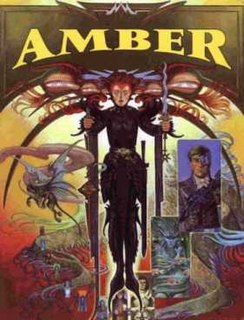
The Amber Diceless Roleplaying Game is a role-playing game created and written by Erick Wujcik, set in the fictional universe created by author Roger Zelazny for his Chronicles of Amber. The game is unusual in that no dice are used in resolving conflicts or player actions; instead a simple diceless system of comparative ability, and narrative description of the action by the players and gamemaster, is used to determine how situations are resolved.

The Generic Universal RolePlaying System, or GURPS, is a tabletop role-playing game system designed to allow for play in any game setting. It was created by Steve Jackson Games and first published in 1986 at a time when most such systems were story- or genre-specific.

Marvel Super Heroes (MSHRPG) is a role playing game set in the Marvel Universe, first published by TSR as Marvel Super Heroes: The Heroic Role-Playing Game under license from Marvel Comics in 1984. In 1986, TSR published an expanded edition, entitled the Marvel Superheroes Advanced Game. Jeff Grubb designed both editions, and Steve Winter wrote both editions. Both use the same game system.

RuneQuest is a fantasy role-playing game created by Steve Perrin and others, set in Greg Stafford's mythical world of Glorantha, and first published in 1978 by Chaosium. RuneQuest is notable for its system, designed around percentile dice and with an early implementation of skill rules, which became the basis of numerous other games. There have been several editions of the game.
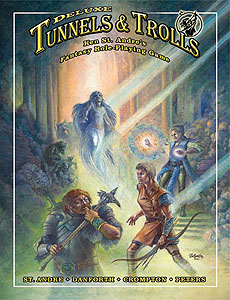
Tunnels & Trolls is a fantasy role-playing game designed by Ken St. Andre and first published in 1975 by Flying Buffalo. The second modern role-playing game published, it was written by Ken St. Andre to be a more accessible alternative to Dungeons & Dragons and is suitable for solitaire, group, and play-by-mail gameplay.
Rolemaster is a tabletop role-playing game published by Iron Crown Enterprises since 1980.
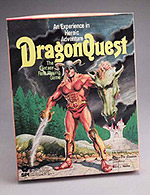
DragonQuest is a fantasy role-playing game originally published by Simulations Publications (SPI) in 1980. Where first generation fantasy role-playing games such as Dungeons & Dragons restricted players to particular character classes, DragonQuest was one of the first games to utilize a system that emphasized skills, allowing more individual customization and a wider range of options.
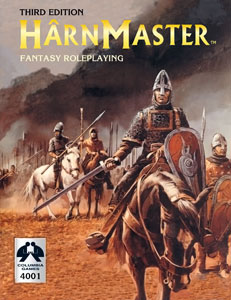
HârnMaster is a fantasy role-playing game based in the fantasy world of Hârn. The system, like the world, was designed primarily by N. Robin Crossby.

Talislanta is a fantasy role-playing game written by Stephen Michael Sechi and published by Bard Games in 1987. There have been six different English-language editions and several foreign language editions published. All English-language products of Talislanta are now freely available via a Creative Commons licence.

The Star Wars Roleplaying Game is a d20 System roleplaying game set in the Star Wars universe. The game was written by Bill Slavicsek, Andy Collins and J. D. Wiker and published by Wizards of the Coast in late 2000 and revised in 2002. In 2007, Wizards released the Saga Edition of the game, which made major changes in an effort to streamline the rules system.
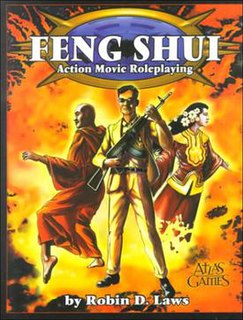
Feng Shui is a martial arts-themed role-playing game, designed by Robin Laws, published first by Daedalus Entertainment and now by Atlas Games. The game shares its setting with the collectible card game Shadowfist. The system is simple, with most detail being in the game's combat system. Combat is made to flow quickly, moving from one action scene to another very quickly. It was inspired and based on Hong Kong style action movies. The characters begin at a high level of skill, as appropriate for protagonists in the source films.
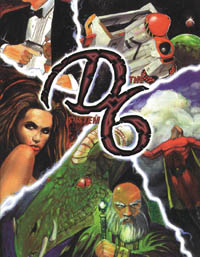
The D6 System is a role-playing game system published by West End Games (WEG) and licensees. While the system is primarily intended for pen-and-paper role-playing games, variations of the system have also been used in live action role-playing games and miniature battle games. The system is named after the 6-sided die, which is used in every roll required by the system.
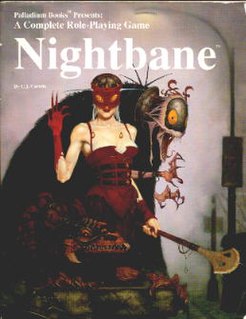
Nightbane is a dark fantasy role-playing game and setting created by C. J. Carella and published by Palladium Books.

The Legend of the Five Rings Roleplaying Game is a role-playing game originally written by John Wick and published by Alderac Entertainment Group, under license from Five Rings Publishing Group, in 1997. The game uses the Legend of the Five Rings setting, and primarily the nation of Rokugan, which is based on feudal Japan with influences from other East Asian cultures.
An attribute is a piece of data that describes to what extent a fictional character in a role-playing game possesses a specific natural, in-born characteristic common to all characters in the game. That piece of data is usually an abstract number or, in some cases, a set of dice. Some games use different terms to refer to an attribute, such as statistic, (primary) characteristic or ability. A number of role-playing games like Fate do not use attributes at all.
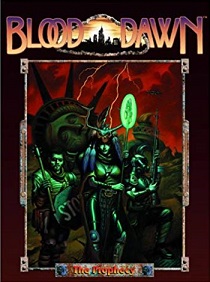
Blood Dawn is a cyberpunk role-playing game designed by Lawrence R. Sims and first published by Optimus Design Systems in 1996.

Lord of the Rings Adventure Game is a role-playing game based on the writings of J. R. R. Tolkien under license from Tolkien Enterprises. Iron Crown Enterprises (I.C.E.) published the game until they lost the license on 22 September 1999.

Aliens Adventure Game is a combat-oriented role-playing game published by Leading Edge Games in 1991.

Don't Look Back: Terror is Never Far Behind (DLB) is a supernatural and paranormal horror-themed role-playing game set in modern times that was initially published in 1994 by Mind Ventures.
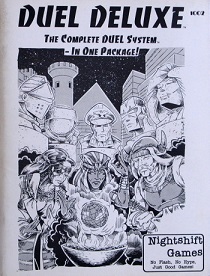
Duel is a combat-focussed role-playing game published by Nightshift Games in 1992.


















